- Skip to main content
- Skip to primary sidebar
- Skip to footer
- QuestionPro

- Solutions Industries Gaming Automotive Sports and events Education Government Travel & Hospitality Financial Services Healthcare Cannabis Technology Use Case AskWhy Communities Audience Contactless surveys Mobile LivePolls Member Experience GDPR Positive People Science 360 Feedback Surveys
- Resources Blog eBooks Survey Templates Case Studies Training Help center
Home Market Research

Empirical Research: Definition, Methods, Types & steps
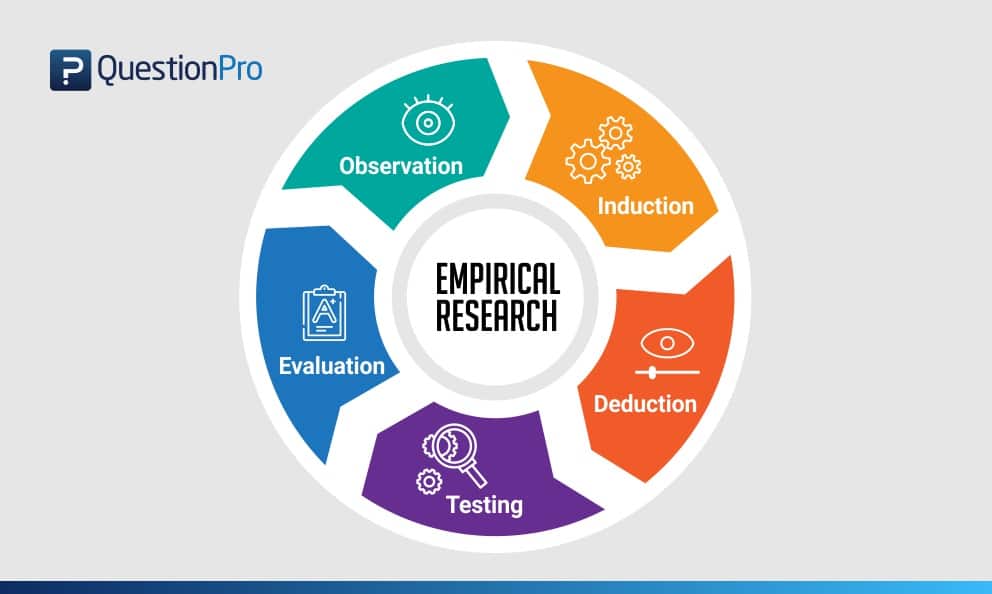
Empirical research is a way of learning through direct observation or experience. Instead of relying on theories or ideas alone, it gathers real-world data to understand how things work.
Researchers ask questions, conduct experiments, observe different situations, and carefully collect evidence to find answers. This method not only ensures that our beliefs are supported by facts but also reassures us that our understanding is based on solid evidence rather than mere assumptions.
In our everyday lives, we engage in informal empirical research whenever we try things and learn from the outcomes, making it an effective and relatable way to uncover the truth.
What is Empirical Research?
Empirical research depends on direct or indirect actual experience and observation as its primary source of knowledge. It focuses on collecting real-world data to answer specific research questions and solve practical problems. This method is widely used across various fields, as it helps professionals validate hypotheses with solid evidence rather than relying on assumptions.
In professional practices, empirical research is vital because it informs decisions with data-driven insights, ensuring that theories are tested and applicable in real-world scenarios.
In addition to advancing knowledge in current studies, empirical research sets a foundation for future studies. By answering specific research questions and testing new hypotheses, it continuously builds on previous findings and opens up new areas for exploration.
This empirical evidence can be gathered using quantitative market research and qualitative market research methods.
For example: A research is being conducted to find out if listening to happy music in the workplace while working may promote creativity? An experiment is conducted by using a music website survey on a set of audience who are exposed to happy music and another set who are not listening to music at all, and the subjects are then observed. The results derived from such a research will give empirical evidence if it does promote creativity or not.
Origin of Empirical Research
You must have heard the quote, “I will not believe it unless I see it.” This concept originated from the ancient empiricists, a fundamental understanding that:
- Powered the emergence of medieval science during the Renaissance period.
- Laid the foundation for modern science as we know it today.
The term “empirical” has its roots in Greek, derived from the word empirics , which means “experienced.”
In today’s world, empirical research refers to:
- The collection of data using evidence gathered through observation or experience.
- Observed and measured phenomena through experiments or by using calibrated scientific instruments.
- Reliance on previous studies and their methodology to design and validate new research.
All of these methods have one key factor in common: dependence on observation and experimentation to collect data, test hypotheses, and draw conclusions.
Empirical research can be categorized into:
- Quantitative research involves numerical data, statistical analysis, and the measurement of variables.
- Qualitative research focuses on non-numerical data and the interpretation of patterns and meanings.
In essence, empirical research relies on real-world evidence to form conclusions, distinguishing it from purely theoretical or speculative approaches.
Types And Methodologies of Empirical Research
Empirical research can be conducted and analysed using qualitative or quantitative methods.
- Quantitative research : Quantitative research methods are used to gather information through numerical data. It is used to quantify opinions, behaviors or other defined variables . These are predetermined and are in a more structured format. Some of the commonly used methods are survey, longitudinal studies, polls, etc
- Qualitative research: Qualitative research methods are used to gather non numerical data. It is used to find meanings, opinions, or the underlying reasons from its subjects. These methods are unstructured or semi structured. The sample size for such a research is usually small and it is a conversational type of method to provide more insight or in-depth information about the problem Some of the most popular forms of methods are focus groups, experiments, interviews, etc.
Data collected from these will need to be analysed. Empirical evidence can also be analysed either quantitatively and qualitatively. Using this, the researcher can answer empirical questions which have to be clearly defined and answerable with the findings he has got.
The type of research design used will vary depending on the field in which it is going to be used. Many of them might choose to do a collective research involving quantitative and qualitative method to better answer questions which cannot be studied in a laboratory setting.
Quantitative Research Methods
Quantitative research methods aid in analyzing the empirical evidence gathered. By using these a researcher can find out if his hypothesis is supported or not.
1. Survey Research
Survey research generally involves a large audience to collect a large amount of data. This is a quantitative method having a predetermined set of closed questions which are pretty easy to answer. Because of the simplicity of such a method, high responses are achieved. It is one of the most commonly used methods for all kinds of research in today’s world.
Previously, surveys were taken face to face only with maybe a recorder. However, with advancement in technology and for ease, new mediums such as emails , or social media have emerged.
For example: Depletion of energy resources is a growing concern and hence there is a need for awareness about renewable energy. According to recent studies, fossil fuels still account for around 80% of energy consumption in the United States. Even though there is a rise in the use of green energy every year, there are certain parameters because of which the general population is still not opting for green energy.
In order to understand why, a survey can be conducted to gather opinions of the general population about green energy and the factors that influence their choice of switching to renewable energy. Such a survey can help institutions or governing bodies to promote appropriate awareness and incentive schemes to push the use of greener energy.
2. Experimental Research
In experimental research , an experiment is set up and a hypothesis is tested by creating a situation in which one of the variable is manipulated. This is also used to check cause and effect. It is tested to see what happens to the independent variable if the other one is removed or altered. The process for such a method is usually proposing a hypothesis, experimenting on it, analyzing the findings and reporting the findings to understand if it supports the theory or not.
For example: A particular product company is trying to find what is the reason for them to not be able to capture the market. So the organisation makes changes in each one of the processes like manufacturing, marketing, sales and operations. Through the experiment they understand that sales training directly impacts the market coverage for their product. If the person is trained well, then the product will have better coverage.
3. Correlational Research
Correlational research is used to find relation between two set of variables . Regression analysis is generally used to predict outcomes of such a method. It can be positive, negative or neutral correlation.
For example: Higher educated individuals will get higher paying jobs. This means higher education enables the individual to high paying job and less education will lead to lower paying jobs.
4. Longitudinal Study
Longitudinal study is used to understand the traits or behavior of a subject under observation after repeatedly testing the subject over a period of time. Data collected from such a method can be qualitative or quantitative in nature.
For example: A research to find out benefits of exercise. The target is asked to exercise everyday for a particular period of time and the results show higher endurance, stamina, and muscle growth. This supports the fact that exercise benefits an individual body.
5. Cross Sectional
Cross sectional study is an observational type of method, in which a set of audience is observed at a given point in time. In this type, the set of people are chosen in a fashion which depicts similarity in all the variables except the one which is being researched.
This type does not enable the researcher to establish a cause and effect relationship as it is not observed for a continuous time period. It is majorly used by healthcare sector or the retail industry.
For example: A medical study to find the prevalence of under-nutrition disorders in kids of a given population. This will involve looking at a wide range of parameters like age, ethnicity, location, incomes and social backgrounds. If a significant number of kids coming from poor families show under-nutrition disorders, the researcher can further investigate into it. Usually a cross sectional study is followed by a longitudinal study to find out the exact reason.
6. Causal-Comparative Research
This method is based on comparison. It is mainly used to find out cause-effect relationship between two variables or even multiple variables.
For example: A researcher measured the productivity of employees in a company which gave breaks to the employees during work and compared that to the employees of the company which did not give breaks at all.
Qualitative Research Methods
Some research questions need to be analysed qualitatively, as quantitative methods are not applicable there. In many cases, in-depth information is needed or a researcher may need to observe a target audience behavior, hence the results needed are in a descriptive analysis form. Qualitative research results will be descriptive rather than predictive. It enables the researcher to build or support theories for future potential quantitative research. In such a situation qualitative research methods are used to derive a conclusion to support the theory or hypothesis being studied.
1. Case Study
Case study method is used to find more information through carefully analyzing existing cases. It is very often used for business research or to gather empirical evidence for investigation purpose. It is a method to investigate a problem within its real life context through existing cases.
The researcher has to carefully analyse making sure the parameter and variables in the existing case are the same as to the case that is being investigated. Using the findings from the case study, conclusions can be drawn regarding the topic that is being studied.
For example: A report mentioning the solution provided by a company to its client. The challenges they faced during initiation and deployment, the findings of the case and solutions they offered for the problems. Such case studies are used by most companies as it forms an empirical evidence for the company to promote in order to get more business.
2. Observational Method
Observational method is a process to observe and gather data from its target. Since it is a qualitative method it is time consuming and very personal. It can be said that observational research method is a part of ethnographic research which is also used to gather empirical evidence. This is usually a qualitative form of research, however in some cases it can be quantitative as well depending on what is being studied.
For example: setting up a research to observe a particular animal in the rain-forests of amazon. Such a research usually take a lot of time as observation has to be done for a set amount of time to study patterns or behavior of the subject. Another example used widely nowadays is to observe people shopping in a mall to figure out buying behavior of consumers.
3. One-on-one Interview
Such a method is purely qualitative and one of the most widely used. The reason being it enables a researcher get precise meaningful data if the right questions are asked. It is a conversational method where in-depth data can be gathered depending on where the conversation leads.
For example: A one-on-one interview with the finance minister to gather data on financial policies of the country and its implications on the public.
4. Focus Groups
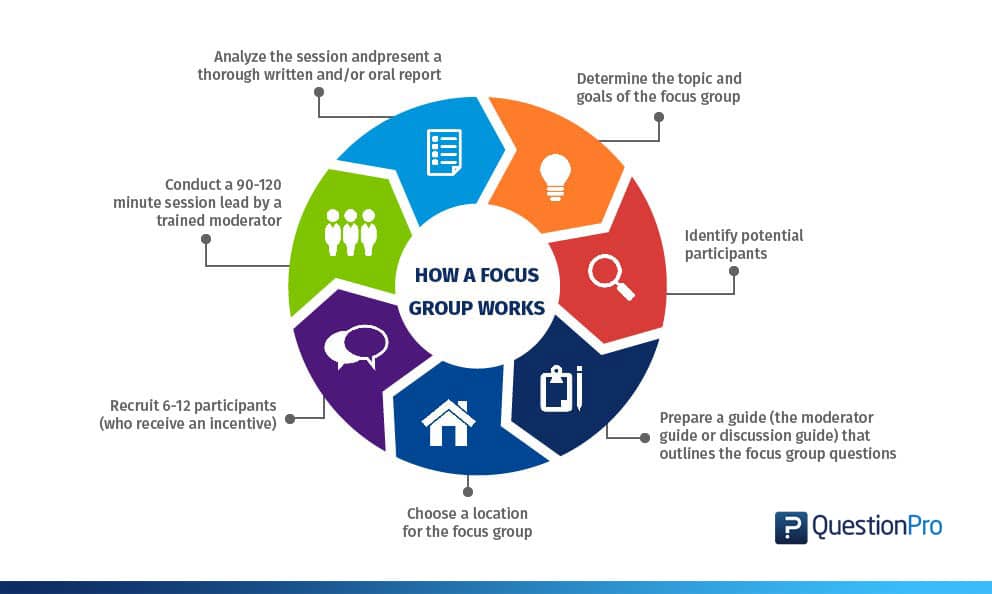
Focus groups are used when a researcher wants to find answers to why, what and how questions. A small group is generally chosen for such a method and it is not necessary to interact with the group in person. A moderator is generally needed in case the group is being addressed in person. This is widely used by product companies to collect data about their brands and the product.
For example: A mobile phone manufacturer wanting to have a feedback on the dimensions of one of their models which is yet to be launched. Such studies help the company meet the demand of the customer and position their model appropriately in the market.
5. Text Analysis
Text analysis method is a little new compared to the other types. Such a method is used to analyse social life by going through images or words used by the individual. In today’s world, with social media playing a major part of everyone’s life, such a method enables the research to follow the pattern that relates to his study.
For example: A lot of companies ask for feedback from the customer in detail mentioning how satisfied are they with their customer support team. Such data enables the researcher to take appropriate decisions to make their support team better.
Sometimes a combination of the methods is also needed for some questions that cannot be answered using only one type of method especially when a researcher needs to gain a complete understanding of complex subject matter.
We recently published a blog that talks about examples of qualitative data in education ; why don’t you check it out for more ideas?
Learn More: Data Collection Methods: Types & Examples
Steps of Conducting Empirical Research
Since empirical research is based on observation and capturing experiences, it is important to plan the steps to conduct the experiment and how to analyse it. This will enable the researcher to resolve problems or obstacles which can occur during the experiment.
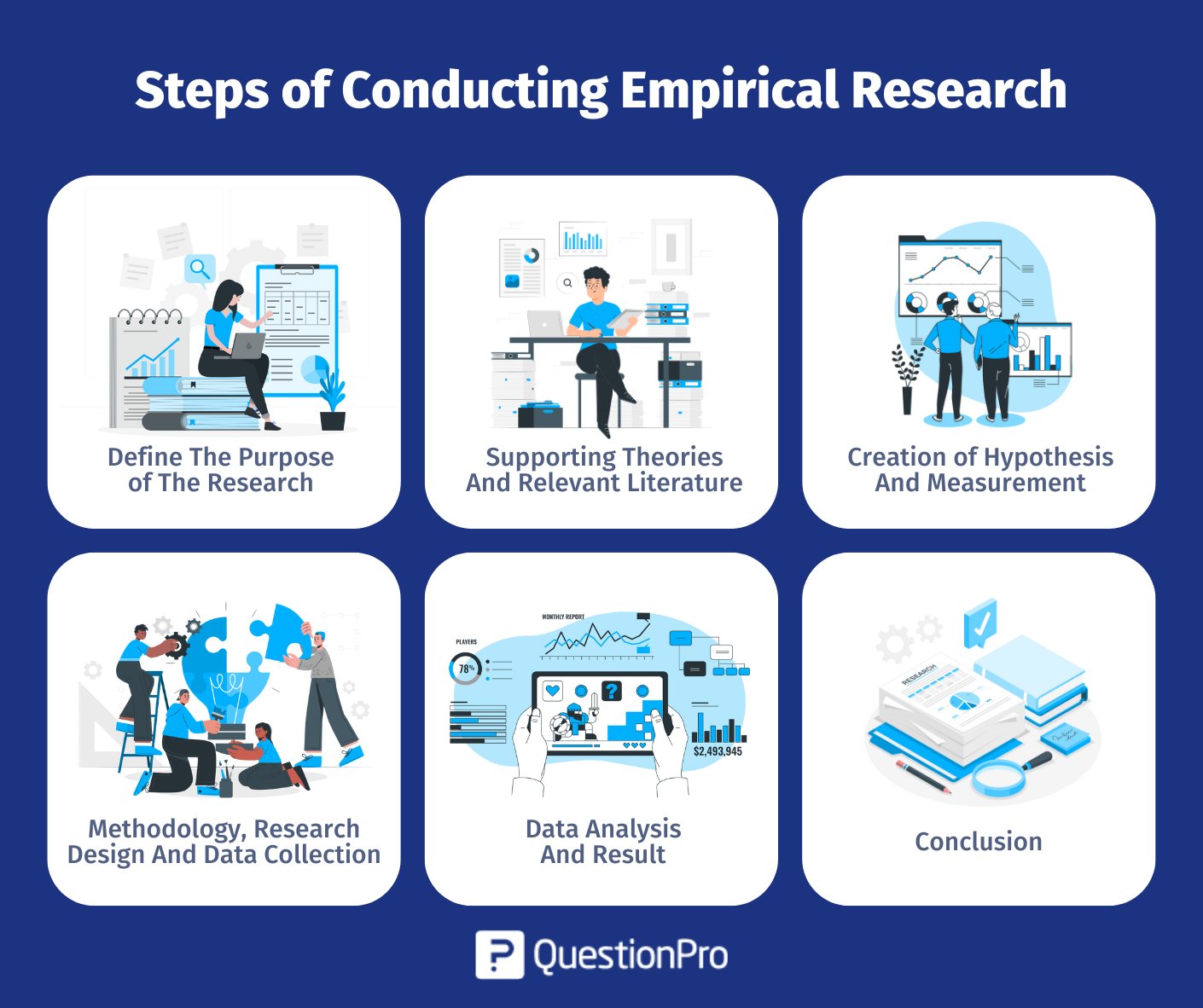
Step #1: Define The Purpose of The Research
This is the step where the researcher has to answer questions like what exactly do I want to find out? What is the problem statement? Are there any issues in terms of the availability of knowledge, data, time or resources. Will this research be more beneficial than what it will cost.
Before going ahead, a researcher has to clearly define his purpose for the research and set up a plan to carry out further tasks.
Step #2 : Supporting Theories And Relevant Literature
The researcher needs to find out if there are theories which can be linked to his research problem . He has to figure out if any theory can help him support his findings. All kind of relevant literature will help the researcher to find if there are others who have researched this before, or what are the problems faced during this research. The researcher will also have to set up assumptions and also find out if there is any history regarding his research problem
Step #3: Creation of Hypothesis And Measurement
Before beginning the actual research he needs to provide himself a working hypothesis or guess what will be the probable result. Researcher has to set up variables, decide the environment for the research and find out how can he relate between the variables.
Researcher will also need to define the units of measurements, tolerable degree for errors, and find out if the measurement chosen will be acceptable by others.
Step #4: Methodology, Research Design And Data Collection
In this step, the researcher has to define a strategy for conducting his research. He has to set up experiments to collect data which will enable him to propose the hypothesis. The researcher will decide whether he will need experimental or non experimental method for conducting the research. The type of research design will vary depending on the field in which the research is being conducted.
Last but not the least, the researcher will have to find out parameters that will affect the validity of the research design. Data collection will need to be done by choosing appropriate samples depending on the research question. To carry out the research, he can use one of the many sampling techniques. Once data collection is complete, researcher will have empirical data which needs to be analysed.
Step #5: Data Analysis And Result
Data analysis can be done in two ways, qualitatively and quantitatively. Researcher will need to find out what qualitative method or quantitative method will be needed or will he need a combination of both. Depending on the unit of analysis of his data, he will know if his hypothesis is supported or rejected. Analyzing this data is the most important part to support his hypothesis.
Step #6: Conclusion
A report will need to be made with the findings of the research. The researcher can give the theories and literature that support his research. He can make suggestions or recommendations for further research on his topic.
Empirical Research Methodology Cycle
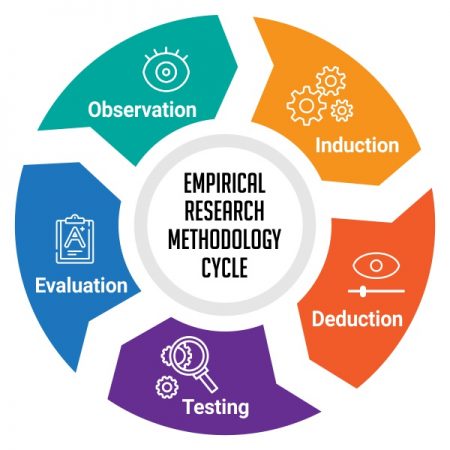
A.D. de Groot, a famous dutch psychologist and a chess expert conducted some of the most notable experiments using chess in the 1940’s. During his study, he came up with a cycle which is consistent and now widely used to conduct empirical research. It consists of 5 phases with each phase being as important as the next one.
The empirical cycle captures the process of coming up with hypothesis about how certain subjects work or behave and then testing these hypothesis against empirical data in a systematic and rigorous approach. It can be said that it characterizes the deductive approach to science. Following is the empirical cycle.
1. Observation
At this phase an idea is sparked for proposing a hypothesis. During this phase empirical data is gathered using observation. For example: a particular species of flower bloom in a different color only during a specific season.
2. Induction
Inductive reasoning is then carried out to form a general conclusion from the data gathered through observation. For example: As stated above it is observed that the species of flower blooms in a different color during a specific season. A researcher may ask a question “does the temperature in the season cause the color change in the flower?” He can assume that is the case, however it is a mere conjecture and hence an experiment needs to be set up to support this hypothesis. So he tags a few set of flowers kept at a different temperature and observes if they still change the color?
3. Deduction
This phase helps the researcher to deduce a conclusion out of his experiment. This has to be based on logic and rationality to come up with specific unbiased results.For example: In the experiment, if the tagged flowers in a different temperature environment do not change the color then it can be concluded that temperature plays a role in changing the color of the bloom.
This phase involves the researcher to return to empirical methods to put his hypothesis to the testing instruments. The researcher now needs to make sense of his data and hence needs to use statistical analysis plans to determine the temperature and bloom color relationship. If the researcher finds out that most flowers bloom a different color when exposed to the certain temperature and the others do not when the temperature is different, he has found support to his hypothesis. Please note this not proof but just a support to his hypothesis.
5. Evaluation
This phase is generally forgotten by most but is an important one to keep gaining knowledge. During this phase the researcher puts forth the data he has collected, the support argument and his conclusion. The researcher also states the limitations for the experiment and his hypothesis and suggests tips for others to pick it up and continue a more in-depth research for others in the future.
Pros and Cons of Empirical Research
As you may have noticed, empirical research has a lot to offer anyone who wants to conduct research and take advantage of its benefits. However, it is essential to consider not only the benefits but also the limitations and possible disadvantages you may encounter when using this methodology.
Below, we will explain both aspects a bit more so that you can consider them when conducting your research using this method.
Advantages of Empirical Research
There is a reason why empirical research is one of the most widely used method. There are a few advantages associated with it. Following are a few of them.
- It is used to authenticate traditional research through various experiments and observations.
- This research methodology makes the research being conducted more competent and authentic.
- It enables a researcher understand the dynamic changes that can happen and change his strategy accordingly.
- The level of control in such a research is high so the researcher can control multiple variables.
- It plays a vital role in increasing internal validity .
Disadvantages of Empirical Research
Even though empirical research makes the research more competent and authentic, it does have a few disadvantages. Following are a few of them.
- Such a research needs patience as it can be very time consuming. The researcher has to collect data from multiple sources and the parameters involved are quite a few, which will lead to a time consuming research.
- Most of the time, a researcher will need to conduct research at different locations or in different environments, this can lead to an expensive affair.
- There are a few rules in which experiments can be performed and hence permissions are needed. Many a times, it is very difficult to get certain permissions to carry out different methods of this research.
- Collection of data can be a problem sometimes, as it has to be collected from a variety of sources through different methods.
Empirical Research Vs Non-Empirical Research
Empirical and non-empirical research are two fundamental approaches in research methodology. Understanding their key differences helps researchers choose the appropriate method based on their research objectives.
Both empirical and non-empirical research offers valuable insights and contribute uniquely to knowledge. Together, they form a comprehensive approach to exploring, explaining, and expanding knowledge across disciplines.
Why is There a Need for Empirical Research?
Empirical research is important today because most people believe in something only when they can see, hear, or experience it. It is used to validate multiple hypotheses, derive knowledge, and increase human understanding, and it is continuing to do so to advance in various fields.
This often involves using testing instruments to ensure the accuracy and reliability of data collection, especially when it comes to complex variables.
In addition, research participants’ discussion often plays a key role in understanding the results and validating the findings within a theoretical framework that guides the entire study.
Qualitative methods are frequently used to gain deeper insights into participants’ perspectives, helping to contextualize empirical data. A literature review, or multiple literature reviews, also helps ground the research in existing knowledge, linking the new findings with past studies.
For example , pharmaceutical companies use empirical research to test specific drugs on controlled or random groups, using both qualitative methods and testing instruments to study cause and effect. This way, they prove certain theories they had proposed for the specific drug.
Such research is very important, as sometimes it can lead to finding a cure for a long-standing disease. In addition, the use of statistical data is essential for validating results and ensuring their reliability. Empirical research is useful in science, social sciences, business, and many other fields, like history, deriving knowledge through quantitative and qualitative methods.
Use QuestionPro Research Suite for Empirical Research
Using QuestionPro Research Suite for empirical research makes the process easier and more efficient. Here’s why:

01. User-Friendly Data Collection Tools
QuestionPro’s suite of tools, including surveys, polls, and questionnaires, are designed with user-friendliness in mind, making it a breeze to gather real-world data from diverse sources.
02. Highly Customizable
This lets you personalize surveys per your research requirements, ensuring the collected data is always relevant and valuable.
03. Real-Time Analytics
Get immediate feedback with QuestionPro real-time analytics to see trends and patterns in your data immediately
4. Even Better Data Management
The most efficient way of managing large sets of data is to keep the analysis and its outcomes faster and more reliable.
Overall, QuestionPro simplifies the empirical research process and allows you to focus more on data analysis and interpretation than manual collection and organization.
Conclusion About Empirical Research
Empirical research is a tool for understanding data and deducing its meaning. By focusing on what can be measured or experienced, we are better equipped to think critically and develop practical solutions.
When identifying empirical research, we focus on real-world data and its key characteristics, such as observation, experimentation, and evidence-based conclusions. The research process involves careful data collection, analysis, and the ability to communicate empirical research findings.
In doing so, we can make sense of the data and our feelings, leading to more informed decisions. Ultimately, empirical research enables us to transition from mere assumptions to solid evidence. Identifying patterns and validating hypotheses can improve outcomes in scientific and daily fields.
LEARN MORE FREE TRIAL
Frequently Asked Questions( FAQs)
Empirical research is a type of study that relies on observation, experience, or experimentation to gather data. It involves collecting evidence through direct or indirect observation of real-world phenomena and analyzing that data to form conclusions, often using scientific methods such as experiments or surveys.
Examples of empirical research include: 1. Conducting experiments to test a scientific hypothesis. 2. Surveying individuals to gather opinions or behaviors. 3. Observing wildlife in their natural environment. 4. Measuring the effects of a treatment in a clinical trial. 5. Analyzing historical data to identify trends or patterns.
Empirical research relies on observation and data collection through experiments or real-world evidence, whether quantitative (numerical) or qualitative (non-numerical). Qualitative research , a subset of empirical research, focuses specifically on understanding patterns, behaviors, and experiences through non-numerical data like interviews, observations, or texts.
MORE LIKE THIS

Are You Doing Too Good A Job? — Tuesday CX Thoughts
Nov 26, 2024


Qualtrics Employee Experience Alternatives: The 6 Best in 2024
Nov 19, 2024

Reputation Management: How to Protect Your Brand Reputation?
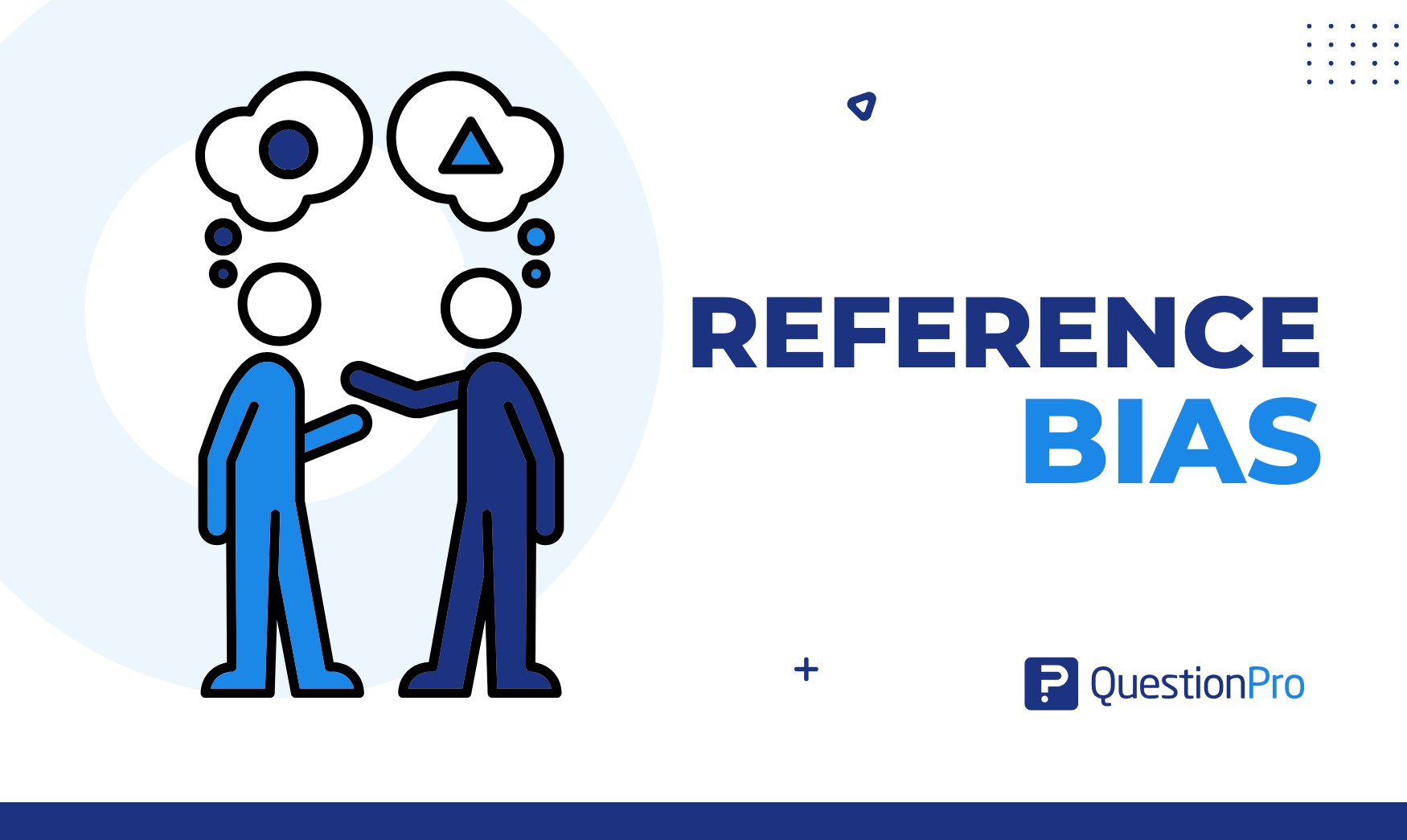
Reference Bias: Identifying and Reducing in Surveys and Research
Other categories.
- Academic Research
- Artificial Intelligence
- Assessments
- Brand Awareness
- Case Studies
- Communities
- Consumer Insights
- Customer effort score
- Customer Engagement
- Customer Experience
- Customer Loyalty
- Customer Research
- Customer Satisfaction
- Employee Benefits
- Employee Engagement
- Employee Retention
- Friday Five
- General Data Protection Regulation
- Insights Hub
- Life@QuestionPro
- Market Research
- Mobile diaries
- Mobile Surveys
- New Features
- Online Communities
- Question Types
- Questionnaire
- QuestionPro Products
- Release Notes
- Research Tools and Apps
- Revenue at Risk
- Survey Templates
- Training Tips
- Tuesday CX Thoughts (TCXT)
- Uncategorized
- What’s Coming Up
- Workforce Intelligence

- University of Memphis Libraries
- Research Guides
Empirical Research: Defining, Identifying, & Finding
Defining empirical research, what is empirical research, quantitative or qualitative.
- Introduction
- Database Tools
- Search Terms
- Image Descriptions
Calfee & Chambliss (2005) (UofM login required) describe empirical research as a "systematic approach for answering certain types of questions." Those questions are answered "[t]hrough the collection of evidence under carefully defined and replicable conditions" (p. 43).
The evidence collected during empirical research is often referred to as "data."
Characteristics of Empirical Research
Emerald Publishing's guide to conducting empirical research identifies a number of common elements to empirical research:
- A research question , which will determine research objectives.
- A particular and planned design for the research, which will depend on the question and which will find ways of answering it with appropriate use of resources.
- The gathering of primary data , which is then analysed.
- A particular methodology for collecting and analysing the data, such as an experiment or survey.
- The limitation of the data to a particular group, area or time scale, known as a sample [emphasis added]: for example, a specific number of employees of a particular company type, or all users of a library over a given time scale. The sample should be somehow representative of a wider population.
- The ability to recreate the study and test the results. This is known as reliability .
- The ability to generalize from the findings to a larger sample and to other situations.
If you see these elements in a research article, you can feel confident that you have found empirical research. Emerald's guide goes into more detail on each element.
Empirical research methodologies can be described as quantitative, qualitative, or a mix of both (usually called mixed-methods).
Ruane (2016) (UofM login required) gets at the basic differences in approach between quantitative and qualitative research:
- Quantitative research -- an approach to documenting reality that relies heavily on numbers both for the measurement of variables and for data analysis (p. 33).
- Qualitative research -- an approach to documenting reality that relies on words and images as the primary data source (p. 33).
Both quantitative and qualitative methods are empirical . If you can recognize that a research study is quantitative or qualitative study, then you have also recognized that it is empirical study.
Below are information on the characteristics of quantitative and qualitative research. This video from Scribbr also offers a good overall introduction to the two approaches to research methodology:
Characteristics of Quantitative Research
Researchers test hypotheses, or theories, based in assumptions about causality, i.e. we expect variable X to cause variable Y. Variables have to be controlled as much as possible to ensure validity. The results explain the relationship between the variables. Measures are based in pre-defined instruments.
Examples: experimental or quasi-experimental design, pretest & post-test, survey or questionnaire with closed-ended questions. Studies that identify factors that influence an outcomes, the utility of an intervention, or understanding predictors of outcomes.
Characteristics of Qualitative Research
Researchers explore “meaning individuals or groups ascribe to social or human problems (Creswell & Creswell, 2018, p3).” Questions and procedures emerge rather than being prescribed. Complexity, nuance, and individual meaning are valued. Research is both inductive and deductive. Data sources are multiple and varied, i.e. interviews, observations, documents, photographs, etc. The researcher is a key instrument and must be reflective of their background, culture, and experiences as influential of the research.
Examples: open question interviews and surveys, focus groups, case studies, grounded theory, ethnography, discourse analysis, narrative, phenomenology, participatory action research.
Calfee, R. C. & Chambliss, M. (2005). The design of empirical research. In J. Flood, D. Lapp, J. R. Squire, & J. Jensen (Eds.), Methods of research on teaching the English language arts: The methodology chapters from the handbook of research on teaching the English language arts (pp. 43-78). Routledge. http://ezproxy.memphis.edu/login?url=http://search.ebscohost.com/login.aspx?direct=true&db=nlebk&AN=125955&site=eds-live&scope=site .
Creswell, J. W., & Creswell, J. D. (2018). Research design: Qualitative, quantitative, and mixed methods approaches (5th ed.). Thousand Oaks: Sage.
How to... conduct empirical research . (n.d.). Emerald Publishing. https://www.emeraldgrouppublishing.com/how-to/research-methods/conduct-empirical-research .
Scribbr. (2019). Quantitative vs. qualitative: The differences explained [video]. YouTube. https://www.youtube.com/watch?v=a-XtVF7Bofg .
Ruane, J. M. (2016). Introducing social research methods : Essentials for getting the edge . Wiley-Blackwell. http://ezproxy.memphis.edu/login?url=http://search.ebscohost.com/login.aspx?direct=true&db=nlebk&AN=1107215&site=eds-live&scope=site .
- << Previous: Home
- Next: Identifying Empirical Research >>
- Last Updated: Apr 2, 2024 11:25 AM
- URL: https://libguides.memphis.edu/empirical-research
Canvas | University | Ask a Librarian
- Library Homepage
- Arrendale Library
Empirical & Non-Empirical Research
- Empirical Research
Introduction: What is Empirical Research?
Quantitative methods, qualitative methods.
- Quantitative vs. Qualitative
- Reference Works for Social Sciences Research
- What is Non-Empirical Research?
- Contact Us!
Call us at 706-776-0111
Chat with a Librarian
Send Us Email
Library Hours
Empirical research is based on phenomena that can be observed and measured. Empirical research derives knowledge from actual experience rather than from theory or belief.
Key characteristics of empirical research include:
- Specific research questions to be answered;
- Definitions of the population, behavior, or phenomena being studied;
- Description of the methodology or research design used to study this population or phenomena, including selection criteria, controls, and testing instruments (such as surveys);
- Two basic research processes or methods in empirical research: quantitative methods and qualitative methods (see the rest of the guide for more about these methods).
(based on the original from the Connelly LIbrary of LaSalle University)

Empirical Research: Qualitative vs. Quantitative
Learn about common types of journal articles that use APA Style, including empirical studies; meta-analyses; literature reviews; and replication, theoretical, and methodological articles.
Academic Writer
© 2024 American Psychological Association.
- More about Academic Writer ...
Quantitative Research
A quantitative research project is characterized by having a population about which the researcher wants to draw conclusions, but it is not possible to collect data on the entire population.
- For an observational study, it is necessary to select a proper, statistical random sample and to use methods of statistical inference to draw conclusions about the population.
- For an experimental study, it is necessary to have a random assignment of subjects to experimental and control groups in order to use methods of statistical inference.
Statistical methods are used in all three stages of a quantitative research project.
For observational studies, the data are collected using statistical sampling theory. Then, the sample data are analyzed using descriptive statistical analysis. Finally, generalizations are made from the sample data to the entire population using statistical inference.
For experimental studies, the subjects are allocated to experimental and control group using randomizing methods. Then, the experimental data are analyzed using descriptive statistical analysis. Finally, just as for observational data, generalizations are made to a larger population.
Iversen, G. (2004). Quantitative research . In M. Lewis-Beck, A. Bryman, & T. Liao (Eds.), Encyclopedia of social science research methods . (pp. 897-898). Thousand Oaks, CA: SAGE Publications, Inc.
Qualitative Research
What makes a work deserving of the label qualitative research is the demonstrable effort to produce richly and relevantly detailed descriptions and particularized interpretations of people and the social, linguistic, material, and other practices and events that shape and are shaped by them.
Qualitative research typically includes, but is not limited to, discerning the perspectives of these people, or what is often referred to as the actor’s point of view. Although both philosophically and methodologically a highly diverse entity, qualitative research is marked by certain defining imperatives that include its case (as opposed to its variable) orientation, sensitivity to cultural and historical context, and reflexivity.
In its many guises, qualitative research is a form of empirical inquiry that typically entails some form of purposive sampling for information-rich cases; in-depth interviews and open-ended interviews, lengthy participant/field observations, and/or document or artifact study; and techniques for analysis and interpretation of data that move beyond the data generated and their surface appearances.
Sandelowski, M. (2004). Qualitative research . In M. Lewis-Beck, A. Bryman, & T. Liao (Eds.), Encyclopedia of social science research methods . (pp. 893-894). Thousand Oaks, CA: SAGE Publications, Inc.
- Next: Quantitative vs. Qualitative >>
- Last Updated: Oct 4, 2024 12:10 PM
- URL: https://library.piedmont.edu/empirical-research
- Ebooks & Online Video
- New Materials
- Renew Checkouts
- Faculty Resources
- Library Friends
- Library Services
- Our Mission
- Library History
- Ask a Librarian!
- Making Citations
- Working Online
Arrendale Library Piedmont University 706-776-0111
Understanding the Empirical Method in Research Methodology
Have you ever wondered how scientists gather evidence to support their theories? Or what steps researchers take to ensure that their findings are reliable and not just based on speculation? The answer lies in a cornerstone of scientific investigation known as the empirical method . This approach to research is all about collecting data and observing the world to form solid, evidence-based conclusions. Let’s dive into the empirical method’s fascinating world and understand why it’s so critical in research methodology.
Table of Contents
- What is the empirical method?
- The role of observation in the empirical method
- Data collection: qualitative and quantitative
- Empirical vs. experimental methods
- Why the distinction matters
- The significance of experiential learning
- Developing theories from empirical research
- Applying the empirical method in various fields
- Challenges and limitations
What is the empirical method? 🔗
The empirical method is a way of gaining knowledge by means of direct and indirect observation or experience. It’s fundamentally based on the idea that knowledge comes from sensory experience and can be acquired through observation and experimentation. This method stands in contrast to approaches that rely solely on theoretical or logical means.
The role of observation in the empirical method 🔗
Observation is at the heart of the empirical method. It involves using your senses to gather information about the world. This could be as simple as noting the color of a flower or as complex as using advanced technology to observe the behavior of microscopic organisms. The key is that the observations must be systematic and replicable, providing reliable data that can be used to draw conclusions.
Data collection: qualitative and quantitative 🔗
Different types of data can be collected using the empirical method:
- Qualitative data – This data type is descriptive and conceptual, often collected through interviews, observations, and case studies.
- Quantitative data – This involves numerical data collected through methods like surveys, experiments, and statistical analysis.
Empirical vs. experimental methods 🔗
While the empirical method is often associated with experimentation, it’s important to distinguish between the two. Experimental methods involve controlled tests where the researcher manipulates one variable to observe the effect on another. In contrast, the empirical method doesn’t necessarily involve manipulation. Instead, it focuses on observing and collecting data in natural settings, offering a broader understanding of phenomena as they occur in real life.
Why the distinction matters 🔗
Understanding the difference between empirical and experimental methods is crucial because it affects how research is conducted and how results are interpreted. Empirical research can provide a more naturalistic view of the subject matter, whereas experimental research can offer more control over variables and potentially more precise outcomes.
The significance of experiential learning 🔗
The empirical method has deep roots in experiential learning, which emphasizes learning through experience. This connection is vital because it underlines the importance of engaging with the subject matter at a practical level, rather than just theoretically. It’s a hands-on approach to knowledge that has been valued since the time of Aristotle.
Developing theories from empirical research 🔗
One of the most significant aspects of the empirical method is its role in theory development . Researchers collect and analyze data, and from these findings, they can formulate or refine theories. Theories that are supported by empirical evidence tend to be more robust and widely accepted in the scientific community.
Applying the empirical method in various fields 🔗
The empirical method is not limited to the natural sciences. It’s used across a range of disciplines, from social sciences to humanities, to understand different aspects of the world. For instance:
- In psychology , researchers might use the empirical method to observe and record behaviors to understand the underlying mental processes.
- In sociology , it could involve studying social interactions to draw conclusions about societal structures.
- In economics , empirical data might be used to test the validity of economic theories or to measure market trends.
Challenges and limitations 🔗
Despite its importance, the empirical method has its challenges and limitations. One major challenge is ensuring that observations and data collection are unbiased. Additionally, not all phenomena are easily observable, and some may require more complex or abstract approaches.
Conclusion 🔗
The empirical method is a fundamental aspect of research methodology that has stood the test of time. By relying on observation and data collection, it allows researchers to ground their theories in reality, providing a solid foundation for knowledge. Whether it’s used in the hard sciences, social sciences, or humanities, the empirical method continues to be a critical tool for understanding our complex world.
How do you think the empirical method affects the credibility of research findings? And can you think of a situation where empirical methods might be difficult to apply but still necessary for advancing knowledge? Let’s discuss these thought-provoking questions and consider the breadth of the empirical method’s impact on the pursuit of understanding.
How useful was this post?
Click on a star to rate it!
Average rating / 5. Vote count:
No votes so far! Be the first to rate this post.
We are sorry that this post was not useful for you!
Let us improve this post!
Tell us how we can improve this post?
Leave a Reply Cancel reply
Your email address will not be published. Required fields are marked *
Save my name, email, and website in this browser for the next time I comment.
Research Methodology
1 Introduction to Research in General
- Research in General
- Research Circle
- Tools of Research
- Methods: Quantitative or Qualitative
- The Product: Research Report or Papers
2 Original Unity of Philosophy and Science
- Myth Philosophy and Science: Original Unity
- The Myth: A Spiritual Metaphor
- Myth Philosophy and Science
- The Greek Quest for Unity
- The Ionian School
- Towards a Grand Unification Theory or Theory of Everything
- Einstein’s Perennial Quest for Unity
3 Evolution of the Distinct Methods of Science
- Definition of Scientific Method
- The Evolution of Scientific Methods
- Theory-Dependence of Observation
- Scope of Science and Scientific Methods
- Prevalent Mistakes in Applying the Scientific Method
4 Relation of Scientific and Philosophical Methods
- Definitions of Scientific and Philosophical method
- Philosophical method
- Scientific method
- The relation
- The Importance of Philosophical and scientific methods
5 Dialectical Method
- Introduction and a Brief Survey of the Method
- Types of Dialectics
- Dialectics in Classical Philosophy
- Dialectics in Modern Philosophy
- Critique of Dialectical Method
6 Rational Method
- Understanding Rationalism
- Rational Method of Investigation
- Descartes’ Rational Method
- Leibniz’ Aim of Philosophy
- Spinoza’ Aim of Philosophy
7 Empirical Method
- Common Features of Philosophical Method
- Empirical Method
- Exposition of Empiricism
- Locke’s Empirical Method
- Berkeley’s Empirical Method
- David Hume’s Empirical Method
8 Critical Method
- Basic Features of Critical Theory
- On Instrumental Reason
- Conception of Society
- Human History as Dialectic of Enlightenment
- Substantive Reason
- Habermasian Critical Theory
- Habermas’ Theory of Society
- Habermas’ Critique of Scientism
- Theory of Communicative Action
- Discourse Ethics of Habermas
9 Phenomenological Method (Western and Indian)
- Phenomenology in Philosophy
- Phenomenology as a Method
- Phenomenological Analysis of Knowledge
- Phenomenological Reduction
- Husserl’s Triad: Ego Cogito Cogitata
- Intentionality
- Understanding ‘Consciousness’
- Phenomenological Method in Indian Tradition
- Phenomenological Method in Religion
10 Analytical Method (Western and Indian)
- Analysis in History of Philosophy
- Conceptual Analysis
- Analysis as a Method
- Analysis in Logical Atomism and Logical Positivism
- Analytic Method in Ethics
- Language Analysis
- Quine’s Analytical Method
- Analysis in Indian Traditions
11 Hermeneutical Method (Western and Indian)
- The Power (Sakti) to Convey Meaning
- Three Meanings
- Pre-understanding
- The Semantic Autonomy of the Text
- Towards a Fusion of Horizons
- The Hermeneutical Circle
- The True Scandal of the Text
- Literary Forms
12 Deconstructive Method
- The Seminal Idea of Deconstruction in Heidegger
- Deconstruction in Derrida
- Structuralism and Post-structuralism
- Sign Signifier and Signified
- Writing and Trace
- Deconstruction as a Strategic Reading
- The Logic of Supplement
- No Outside-text
13 Method of Bibliography
- Preparing to Write
- Writing a Paper
- The Main Divisions of a Paper
- Writing Bibliography in Turabian and APA
- Sample Bibliography
14 Method of Footnotes
- Citations and Notes
- General Hints for Footnotes
- Writing Footnotes
- Examples of Footnote or Endnote
- Example of a Research Article
15 Method of Notes Taking
- Methods of Note-taking
- Note Book Style
- Note taking in a Computer
- Types of Note-taking
- Notes from Field Research
- Errors to be Avoided
16 Method of Thesis Proposal and Presentation
- Preliminary Section
- Presenting the Problem of the Thesis
- Design of the Study
- Main Body of the Thesis
- Conclusion Summary and Recommendations
- Reference Material
Share on Mastodon
Empirical Research
- Reference work entry
- First Online: 01 January 2020
- Cite this reference work entry

- Emeka Thaddues Njoku 3
287 Accesses
1 Citations
The term “empirical” entails gathered data based on experience, observations, or experimentation. In empirical research, knowledge is developed from factual experience as opposed to theoretical assumption and usually involved the use of data sources like datasets or fieldwork, but can also be based on observations within a laboratory setting. Testing hypothesis or answering definite questions is a primary feature of empirical research. Empirical research, in other words, involves the process of employing working hypothesis that are tested through experimentation or observation. Hence, empirical research is a method of uncovering empirical evidence.
Through the process of gathering valid empirical data, scientists from a variety of fields, ranging from the social to the natural sciences, have to carefully design their methods. This helps to ensure quality and accuracy of data collection and treatment. However, any error in empirical data collection process could inevitably render such...
This is a preview of subscription content, log in via an institution to check access.
Access this chapter
Subscribe and save.
- Get 10 units per month
- Download Article/Chapter or eBook
- 1 Unit = 1 Article or 1 Chapter
- Cancel anytime
- Available as PDF
- Read on any device
- Instant download
- Own it forever
- Available as EPUB and PDF
Tax calculation will be finalised at checkout
Purchases are for personal use only
Institutional subscriptions
Bibliography
Bhattacherjee, A. (2012). Social science research: Principles, methods, and practices. Textbooks Collection . Book 3.
Google Scholar
Comte, A., & Bridges, J. H. (Tr.) (1865). A general view of positivism . Trubner and Co. (reissued by Cambridge University Press, 2009).
Dilworth, C. B. (1982). Empirical research in the literature class. English Journal, 71 (3), 95–97.
Article Google Scholar
Heisenberg, W. (1971). Positivism, metaphysics and religion. In R. N. Nanshen (Ed.), Werner Heisenberg – Physics and beyond – Encounters and conversations , World Perspectives. 42. Translator: Arnold J. Pomerans. New York: Harper and Row.
Hossain, F. M. A. (2014). A critical analysis of empiricism. Open Journal of Philosophy, 2014 (4), 225–230.
Kant, I. (1783). Prolegomena to any future metaphysic (trans: Bennett, J.). Early Modern Texts. www.earlymoderntexts.com
Koch, S. (1992). Psychology’s Bridgman vs. Bridgman’s Bridgman: An essay in reconstruction. Theory and Psychology, 2 (3), 261–290.
Matin, A. (1968). An outline of philosophy . Dhaka: Mullick Brothers.
Mcleod, S. (2008). Psychology as science. http://www.simplypsychology.org/science-psychology.html
Popper, K. (1963). Conjectures and refutations: The growth of scientific knowledge . London: Routledge.
Simmel, G. (1908). The problem areas of sociology in Kurt H. Wolf: The sociology of Georg Simmel . London: The Free Press.
Weber, M. (1991). The nature of social action. In W. G. Runciman (Ed.), Weber: Selections in translation . Cambridge: Cambridge University Press.
Download references
Author information
Authors and affiliations.
Department of Political Science, University of Ibadan, Ibadan, Oyo, Nigeria
Emeka Thaddues Njoku
You can also search for this author in PubMed Google Scholar
Corresponding author
Correspondence to Emeka Thaddues Njoku .
Editor information
Editors and affiliations.
University of Connecticut, Storrs, CT, USA
David A. Leeming
Blanton-Peale Institute, New York, NY, USA
Rights and permissions
Reprints and permissions
Copyright information
© 2020 Springer Nature Switzerland AG
About this entry
Cite this entry.
Njoku, E.T. (2020). Empirical Research. In: Leeming, D.A. (eds) Encyclopedia of Psychology and Religion. Springer, Cham. https://doi.org/10.1007/978-3-030-24348-7_200051
Download citation
DOI : https://doi.org/10.1007/978-3-030-24348-7_200051
Published : 12 June 2020
Publisher Name : Springer, Cham
Print ISBN : 978-3-030-24347-0
Online ISBN : 978-3-030-24348-7
eBook Packages : Behavioral Science and Psychology Reference Module Humanities and Social Sciences Reference Module Business, Economics and Social Sciences
Share this entry
Anyone you share the following link with will be able to read this content:
Sorry, a shareable link is not currently available for this article.
Provided by the Springer Nature SharedIt content-sharing initiative
- Publish with us
Policies and ethics
- Find a journal
- Track your research
Penn State University Libraries
Empirical research in the social sciences and education.
- What is Empirical Research and How to Read It
- Finding Empirical Research in Library Databases
- Designing Empirical Research
- Ethics, Cultural Responsiveness, and Anti-Racism in Research
- Citing, Writing, and Presenting Your Work
Contact the Librarian at your campus for more help!

Introduction: What is Empirical Research?
Empirical research is based on observed and measured phenomena and derives knowledge from actual experience rather than from theory or belief.
How do you know if a study is empirical? Read the subheadings within the article, book, or report and look for a description of the research "methodology." Ask yourself: Could I recreate this study and test these results?
Key characteristics to look for:
- Specific research questions to be answered
- Definition of the population, behavior, or phenomena being studied
- Description of the process used to study this population or phenomena, including selection criteria, controls, and testing instruments (such as surveys)
Another hint: some scholarly journals use a specific layout, called the "IMRaD" format, to communicate empirical research findings. Such articles typically have 4 components:
- Introduction: sometimes called "literature review" -- what is currently known about the topic -- usually includes a theoretical framework and/or discussion of previous studies
- Methodology: sometimes called "research design" -- how to recreate the study -- usually describes the population, research process, and analytical tools used in the present study
- Results: sometimes called "findings" -- what was learned through the study -- usually appears as statistical data or as substantial quotations from research participants
- Discussion: sometimes called "conclusion" or "implications" -- why the study is important -- usually describes how the research results influence professional practices or future studies
Reading and Evaluating Scholarly Materials
Reading research can be a challenge. However, the tutorials and videos below can help. They explain what scholarly articles look like, how to read them, and how to evaluate them:
- CRAAP Checklist A frequently-used checklist that helps you examine the currency, relevance, authority, accuracy, and purpose of an information source.
- IF I APPLY A newer model of evaluating sources which encourages you to think about your own biases as a reader, as well as concerns about the item you are reading.
- Credo Video: How to Read Scholarly Materials (4 min.)
- Credo Tutorial: How to Read Scholarly Materials
- Credo Tutorial: Evaluating Information
- Credo Video: Evaluating Statistics (4 min.)
- Credo Tutorial: Evaluating for Diverse Points of View
- Next: Finding Empirical Research in Library Databases >>
- Last Updated: Aug 13, 2024 3:16 PM
- URL: https://guides.libraries.psu.edu/emp

- Ask a Librarian
Research: Overview & Approaches
- Getting Started with Undergraduate Research
- Planning & Getting Started
- Building Your Knowledge Base
- Locating Sources
- Reading Scholarly Articles
- Creating a Literature Review
- Productivity & Organizing Research
- Scholarly and Professional Relationships
Introduction to Empirical Research
Databases for finding empirical research, google scholar, examples of empirical research, sources and further reading.
- Interpretive Research
- Action-Based Research
- Creative & Experimental Approaches
- Technical Support
Your Librarian

This brief video listed above introduces empirical research, questions and methods used in this research approach, provides some tips to locating empirical research studies.
- Engineering Village (Compendex & INSPEC Combined) This information database covers the fields of physics, electronics, computing, control engineering and information technology with technical and scientific journals and conference proceedings.
- Proquest Statistical Insight This database includes statistical information produced by U.S. Federal agencies, States, private organizations, and major intergovernmental organizations.
- Study on radiation transfer in human skin for cosmetics
- Long-Term Mobile Phone Use and the Risk of Vestibular Schwannoma: A Danish Nationwide Cohort Study
- Emissions Impacts and Benefits of Plug-In Hybrid Electric Vehicles and Vehicle-to-Grid Services
- Review of design considerations and technological challenges for successful development and deployment of plug-in hybrid electric vehicles
- Endocrine disrupters and human health: could oestrogenic chemicals in body care cosmetics adversely affect breast cancer incidence in women?
- << Previous: Scholarly and Professional Relationships
- Next: Interpretive Research >>
- Last Updated: Nov 15, 2024 4:30 PM
- URL: https://guides.lib.purdue.edu/research_approaches

IMAGES
VIDEO
COMMENTS
Research is empirical if it seeks to find a general story or explanation, one that applies to various cases and across time. The empirical approach functions to create new knowledge about the way the world actually works.
Empirical research depends on direct or indirect actual experience and observation as its primary source of knowledge. It focuses on collecting real-world data to answer specific research questions and solve practical problems.
What is empirical research, how do you recognize it, and how can you improve your searches to find it?
Empirical research is research using empirical evidence. It is also a way of gaining knowledge by means of direct and indirect observation or experience . Empiricism values some research more than other kinds.
Empirical research is based on phenomena that can be observed and measured. Empirical research derives knowledge from actual experience rather than from theory or belief. Key characteristics of empirical research include: Specific research questions to be answered; Definitions of the population, behavior, or phenomena being studied;
What is the empirical method? The empirical method is a way of gaining knowledge by means of direct and indirect observation or experience. It’s fundamentally based on the idea that knowledge comes from sensory experience and can be acquired through observation and experimentation.
It is about using statistical modeling; in particular, the tool of regression analysis, which is used to develop and refine theories. We define theory broadly as a set of interrelated propositions that seek to explain and, in some cases, predict an observed phenomenon.
In empirical research, knowledge is developed from factual experience as opposed to theoretical assumption and usually involved the use of data sources like datasets or fieldwork, but can also be based on observations within a laboratory setting.
Empirical research is based on observed and measured phenomena and derives knowledge from actual experience rather than from theory or belief. How do you know if a study is empirical? Read the subheadings within the article, book, or report and look for a description of the research "methodology."
This brief video listed above introduces empirical research, questions and methods used in this research approach, provides some tips to locating empirical research studies.